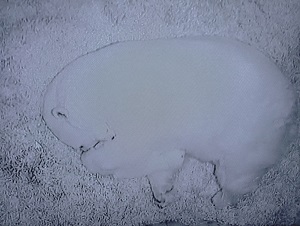Please activate JavaScript in your browser to use all interface options.
Two Polar Bear Cubs Born in Novosibirsk Zoo
14 February 2023
Two polar bear cubs have been born in the Novosibirsk Zoo. This is the fourth time that Kai and Gerda bears, who have been cared for by Rosneft for about 10 years, have become parents.
Andrei Shilo, Director of the Novosibirsk Zoo, shared the details: “At birth, a bear cub is about the size of the palm and weighs about 500 grams. He is quite helpless and totally dependent on his mother. Our Gerda is a wonderful mother. We watch the family through video cameras and see how she takes care of her twins. On frosty days, for example, she would cuddle the cubs and warm them with her breath. Now that they are older, she has started to indulge in a little more movement. Still, she hardly ever goes outside the den. She stands, breathes in the frosty air, eats a little and goes back to the cubs.”
The sex of the newborns is not yet known and will not be determined until a month later, when Gerda will have taken the twins out for the first time. That is when the zoo will start naming the cubs.
For the moment, the zoo staff are careful not to disturb Gerda and the cubs, not even clearing the snow in the enclosure. The Novosibirsk Zoo is confident that this time too, Gerda, as an experienced mother, will successfully raise her cubs.
Kai and Gerda are the same age, 15 years old. Kai had been born in the Leningrad Zoo, Gerda in the Moscow Zoo, then they were moved to Novosibirsk.
The couple had their first child in 2013 - a bear named Shilka, now living in Japan. In 2015, Rostik was born; he was later taken to China. In 2018, Gerda gave birth to twins, Nordi and Shaina, who remain in Novosibirsk for the time being.
Now, there are six polar bears in the Novosibirsk Zoo, counting the newborn twins. Accordingly, Rosneft now has in its care 35 polar bears in 17 zoos across the country. Procreation is an indicator of well-being, which means that the zoo provides all the conditions for the animals to feel well. The Company provides polar bears with full care, including feeding, veterinary care and habitat improvements.
Note for Editors:
Rosneft considers the preservation and protection of polar bears as one of its priorities in the field of environmental protection. Since 2013, all polar bears in all Russian zoos are in the custody of the Company to be provided with adequate nutrition, veterinary service and improved living conditions. Rosneft helped to develop, for the first time in Russia, special toys to encourage polar bears to be more physically active. Several types of toys are made of particularly durable plastic and sent to all member zoos yearly.
Rosneft is also implementing a comprehensive programme to study polar bears in the wild. With Rosneft’s financial support and the direct participation of the Company’s researchers, several large-scale expeditions have taken place since 2016, during which scientists have obtained unique data on the polar bear population. The researchers have studied polar bear migration routes, numbers and distribution densities in the Arctic. This data is extremely important for further research in the Polar region, since the bear is a unique indicator of northern ecosystems, as are other animal species studied by Rosneft: the reindeer, the walrus and the Ivory gull.
Rosneft
Information Division
February 14, 2023

-315xx70.png)

